
BREAST CANCER RESEARCH
Scope & Guideline
Transforming the future of breast cancer treatment.
Introduction
Aims and Scopes
- Molecular and Cellular Biology of Breast Cancer:
The journal publishes research that explores the molecular mechanisms driving breast cancer development, progression, and metastasis, including genetic, epigenetic, and metabolic factors. - Innovative Diagnostic and Treatment Modalities:
Research on novel diagnostic techniques, including imaging and biomarker studies, and therapeutic strategies, such as targeted therapies and immunotherapy, is a core focus. - Epidemiology and Risk Factors:
Studies that investigate the epidemiological aspects of breast cancer, including risk factors, prevention strategies, and population health implications, are regularly featured. - Patient-Centered Research:
The journal encourages research that addresses patient experiences, treatment adherence, and psychosocial factors affecting breast cancer patients, highlighting the importance of patient perspectives in treatment outcomes. - Translational Research and Clinical Trials:
A significant emphasis is placed on translational studies that connect basic research findings to clinical applications, including results from clinical trials that evaluate new treatments and interventions.
Trending and Emerging
- Artificial Intelligence and Machine Learning:
There is a significant increase in research applying AI and machine learning techniques for diagnosis, treatment prediction, and risk assessment, showcasing the integration of technology in breast cancer research. - Immunotherapy and the Tumor Microenvironment:
Emerging studies are increasingly focused on the role of the immune system in breast cancer, including the impact of immune checkpoint inhibitors and the characterization of the tumor microenvironment. - Genomic and Proteomic Profiling:
Research utilizing advanced genomic and proteomic profiling techniques to understand breast cancer heterogeneity and identify novel therapeutic targets is gaining momentum. - Personalized Medicine and Targeted Therapies:
There is a growing emphasis on personalized treatment approaches, particularly studies exploring the efficacy of targeted therapies based on specific molecular markers. - Health Disparities and Socioeconomic Factors:
Research addressing the impact of socioeconomic factors and health disparities on breast cancer outcomes is trending, reflecting a broader commitment to health equity.
Declining or Waning
- Traditional Chemotherapy Approaches:
Research focusing on conventional chemotherapy regimens is less frequently published, as there is a growing emphasis on targeted therapies and personalized medicine. - Basic Histopathology Techniques:
Studies that rely solely on classical histopathology without incorporating advanced imaging or molecular techniques are becoming less common, reflecting a shift towards more integrated approaches. - Generalized Risk Assessment Models:
There is a noticeable decline in publications centered around traditional risk assessment models that do not incorporate genetic or molecular profiling, as more sophisticated methods are being favored. - Single-Agent Treatments:
Research focusing solely on single-agent therapies is waning, with a trend towards combination therapies that enhance treatment efficacy and address resistance mechanisms.
Similar Journals
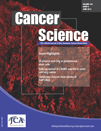
CANCER SCIENCE
Unlocking the mysteries of cancer through rigorous research.Cancer Science, an esteemed journal published by Wiley, stands at the forefront of oncology research, boasting an impressive impact factor and a classification in the Q1 category for its contributions in Cancer Research, Medicine, and Oncology as of 2023. Since its inception in 2003 and transitioning to an Open Access model in 2014, the journal has facilitated global dissemination of critical research findings, ensuring that vital information remains accessible to researchers, clinicians, and students alike. With its comprehensive scope covering cutting-edge discoveries in cancer biochemistry, genetics, and molecular biology, Cancer Science is recognized for its rigorous peer-review process and significant contributions to advancing our understanding of cancer. The journal, located at 111 River St, Hoboken, NJ, is an essential resource for anyone dedicated to improving treatment outcomes and pushing the boundaries of cancer research.

Cancer Medicine
Pioneering discoveries in cancer research for a healthier tomorrow.Cancer Medicine is a leading open access journal published by WILEY, focusing on innovative research and advancements in the fields of Cancer Research, Oncology, and Radiology, with an impressive impact evidenced by its 2023 Q2 ranking in Cancer Research and Q1 rankings in both Oncology and Radiology, Nuclear Medicine and Imaging. With an ISSN of 2045-7634, this journal has been committed to disseminating pivotal findings since its inception in 2012, serving as a vital platform for researchers, practitioners, and students alike. The journal proudly embodies the spirit of open access, ensuring that groundbreaking cancer research is accessible to a global audience. Located in the United Kingdom, it spans a wide array of topics, promising comprehensive insights into cancer therapies, molecular mechanisms, and imaging techniques, thereby significantly contributing to the enhancement of cancer care and treatment outcomes. Researchers interested in exploring the latest advancements in cancer medicine will find this journal an indispensable resource.
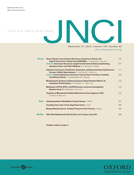
JNCI-Journal of the National Cancer Institute
Driving excellence in cancer research since 1940.JNCI-Journal of the National Cancer Institute, published by Oxford University Press Inc. in the United Kingdom, is a premier journal dedicated to advancing the field of cancer research and oncology. With a distinguished history dating back to 1940, this journal has consistently maintained a strong reputation within the academic community, achieving a remarkable Q1 ranking in both Cancer Research and Oncology as of 2023. Researchers and practitioners rely on the JNCI for original research articles, review papers, and cutting-edge findings that impact clinical practices and therapeutic strategies. Although it does not currently offer open access, the journal remains a vital resource for academicians and healthcare professionals seeking to enhance their understanding of cancer mechanisms and treatment innovations. Its rigorous peer-review process ensures the publication of high-quality, credible research that meets the evolving challenges of cancer treatment and prevention through to 2024.

Gastric Cancer
Exploring Breakthroughs in Gastric Cancer Management.Gastric Cancer is a leading journal in the field of oncology, published by SPRINGER in Japan. With an ISSN of 1436-3291 and an E-ISSN of 1436-3305, this esteemed journal aims to disseminate high-quality research focused on all aspects of gastric cancer, including its pathophysiology, diagnosis, treatment, and prevention. As an indicator of its academic excellence, Gastric Cancer is ranked in the top quartile (Q1) for Cancer Research, Gastroenterology, Medicine (miscellaneous), and Oncology categories as of 2023. The journal holds impressive Scopus rankings, being positioned #9 in Gastroenterology and #34 in Oncology, demonstrating its critical role in shaping advancements within these disciplines. Although not an open-access publication, it provides various access options for institutions and individuals looking to elevate their understanding of gastric cancer. With a converged publication history from 2000 to 2024, it serves as a vital resource for researchers, professionals, and students dedicated to eradicating this formidable disease.
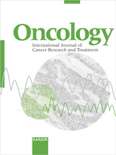
ONCOLOGY
Exploring the forefront of cancer treatment and research.ONCOLOGY is a prestigious journal published by KARGER, dedicated to advancing the field of cancer research and treatment. Established in 1948, this peer-reviewed journal has established a significant presence in the medical community, reflected by its impressive impact factor and Q2 category rankings in both Cancer Research and Oncology as of 2023. With a focus on groundbreaking research and comprehensive reviews, ONCOLOGY serves as a crucial resource for researchers, clinicians, and students interested in the latest developments in the fight against cancer. Although it currently does not offer open access, the journal's reputation ensures that it reaches a wide audience in academia and clinical practice. Its commitment to excellence is underscored by its consistent rankings in key disciplines, making it a vital publication for anyone involved in cancer research, biology, or associated medical fields. The journal is headquartered in Basel, Switzerland, positioning it at the heart of European medical research.
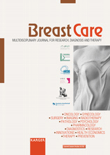
Breast Care
Exploring the Frontiers of Breast Health ScienceBreast Care is a prominent academic journal published by KARGER, focusing on the dynamic fields of oncology and surgery. With an ISSN of 1661-3791 and an E-ISSN of 1661-3805, this peer-reviewed journal has established itself as an essential resource for researchers, clinicians, and students dedicated to advancing breast health. Based in Switzerland, it benefits from a strong academic reputation, evident in its impressive Scopus rankings—placing it in the 79th percentile in Surgery (Rank #115/551) and the 53rd percentile in Oncology (Rank #188/404). The journal is recognized for its rigorous exploration of current trends, innovations, and challenges in breast care, encompassing a wide scope from surgical techniques to oncological therapies. With a Q2 ranking in Oncology and a notable Q1 ranking in Surgery as of 2023, Breast Care not only contributes to the advancement of medical knowledge but also fosters interdisciplinary collaboration among healthcare professionals worldwide.
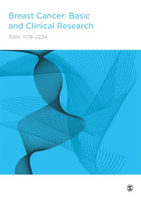
Breast Cancer-Basic and Clinical Research
Fostering collaboration for impactful research.Breast Cancer-Basic and Clinical Research is a premier open access journal published by SAGE Publications Ltd, dedicated to advancing the understanding and treatment of breast cancer through a comprehensive approach that integrates basic and clinical research findings. Since its inception in 2008, this journal has aimed to serve as a vital platform for researchers, healthcare professionals, and students in the fields of oncology and cancer research, providing them with timely access to significant new research, clinical trials, and innovative methodologies. With its current rankings placing it in the Q3 quartile for Cancer Research and Oncology, it reflects a steady commitment to quality and relevance, ranking #167/404 in Medicine - Oncology and #133/230 in Biochemistry, Genetics and Molecular Biology - Cancer Research as of 2023. The journal is designed to foster dialogue and collaboration across disciplines, enabling advancements in therapeutic strategies and patient care. Researchers and professionals will find it an invaluable resource as it continues to push the frontiers of knowledge in breast cancer research.
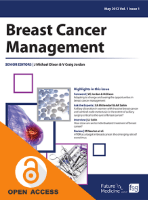
Breast Cancer Management
Transforming Breast Cancer Care Through Collaboration.Breast Cancer Management is a pivotal journal in the field of oncology and radiology, published by FUTURE MEDICINE LTD. Since its transition to Open Access in 2018, the journal has aimed to democratize access to cutting-edge research focused on innovative treatments and management strategies for breast cancer. With an ISSN of 1758-1923 and an E-ISSN of 1758-1931, it provides a platform for researchers and clinicians to share findings that enhance patient care and outcomes. The journal has garnered significant attention, placing in the Q3 quartile in Oncology and Q2 in Radiology, Nuclear Medicine, and Imaging as of 2023. Positioned in the United Kingdom, its editorial focus and rigorous peer-review process ensure that it remains at the forefront of breast cancer research. As breast cancer continues to be a major health concern globally, Breast Cancer Management serves as an essential resource for advancing knowledge and fostering collaboration among professionals in this vital area of medicine.
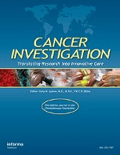
CANCER INVESTIGATION
Unraveling the complexities of cancer through rigorous inquiry.CANCER INVESTIGATION is a distinguished peer-reviewed journal published by Taylor & Francis Inc, dedicated to the advancing field of cancer research and oncology. With an ISSN of 0735-7907 and E-ISSN of 1532-4192, this journal has been a pivotal resource for professionals and researchers since its inception in 1983, continually contributing to the evolving landscape of cancer investigation until its convergence in 2024. CANCER INVESTIGATION boasts noteworthy rankings in 2023, including Q3 in Cancer Research and Q2 in Medicine (miscellaneous), highlighting its relevance and impact in these critical areas. The journal's commitment to disseminating innovative research and comprehensive reviews makes it an essential platform for those engaged in cancer studies and related disciplines. While currently not available as an open-access publication, CANCER INVESTIGATION remains an invaluable tool for understanding the complexities of cancer, offering insights that drive scientific advancements and improve patient outcomes.

JOURNAL OF CANCER RESEARCH AND CLINICAL ONCOLOGY
Championing Excellence in Cancer Research and Clinical Practice.JOURNAL OF CANCER RESEARCH AND CLINICAL ONCOLOGY, published by Springer, is a prestigious peer-reviewed journal dedicated to advancing the fields of cancer research and clinical oncology. With an impact factor reflecting its significance within the academic community, the journal operates under a rigorous quality standard and offers a wealth of knowledge spanning from 1979 and continuing through 2025. With its comprehensive scope, it encompasses a wide array of topics including novel therapeutic strategies, clinical trials, and cutting-edge research methodologies, making it an essential resource for researchers, practitioners, and students alike. The journal’s category quartiles highlight its competitive edge, ranking Q2 in Cancer Research and Q1 in Medicine (miscellaneous) as of 2023. This positioning underscores its role at the forefront of oncology discourse. Through this journal, contributors and readers alike engage with impactful research that informs clinical practices and enhances patient care in oncology. Access to the journal’s content, although not open access, ensures curated and high-quality insights available to the academic and professional community.